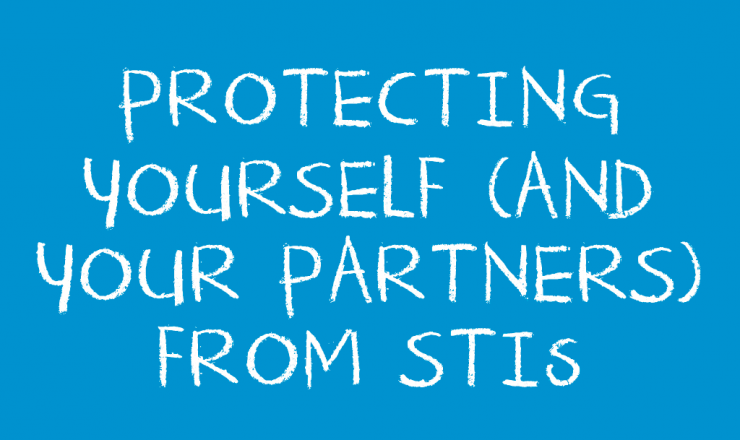Navigating Sex and Gender Dysphoria
Navigating sex can be hard for anyone, but for folks that experience gender dysphoria during sex it can make it even trickier. It may take some practice and experimentation, but it is possible to have sex with dysphoria that feels good and can even be affirming! Below we will share some tips on navigating sex and gender dysphoria, but first let’s define what we’re even talking about.
Gender Dysphoria is a term for stress, conflict, or negative feelings people can feel in relation to their bodies, gender or how others perceive their gender.
Gender Euphoria is a term for the joy, comfort or connection people can feel in relation to their bodies, gender or how others perceive their gender.
Here are some tips folks that experience gender dysphoria might consider when navigating sex:
Notice Feelings of Dysphoria
One instinct we might have is to ignore feelings of dysphoria in hopes they will go away. A problem with this is that it can result in us pushing our own boundaries and becoming extremely uncomfortable or dissociated. Instead, try noticing when dysphoria comes up and finding creative ways to adapt sex (some possible ideas on how to do that coming up next!) or take a break. It doesn’t all have to be focused on dysphoria either, you can also try to notice gender euphoric moments and what makes you feel good and focus on incorporating more of that.
Try to throw away assumptions of what sex “should” be
We get a lot of messages of what sex “should” involve, or what we should and shouldn’t like based on our bodies or genders. But the truth is, sex can be whatever you and anyone else involved want it to be! It may take some experimentation to figure out what works best for you, but figuring out what makes you feel good and what makes you feel uncomfortable is key when navigating dysphoria.
Gender dysphoria and euphoria are experienced differently for everyone. Here are some examples of how some people ignore “shoulds” and make sex work better for them:
- Keeping clothes fully or partially on
- Pleasuring/touching partner(s) but not having partner(s) touch you (or vice versa!)
- Not touching body parts that are a source of dysphoria
- Touching body parts that do feel good and aren’t a source of dysphoria, for example ears, back or butt
- Trying gender affirming products or sex toys that address the type(s) of dysphoria you experience such as binders, gaffs, dildos, vibrators, and more
- Call your body parts whatever you want and ask partner(s) to do the same
- Using motions that feel gender affirming (ex oral sex might feel more comfortable for some folks with an up and down motion and for others with licking motion)
- Going beyond physical sensations- you can read, look at, or listen to things that you find sexy (like erotica, photos, porn, or music), or fantasize about situations that turn you on
Self Pleasure
Exploring masturbation and self pleasure can be amazing ways to explore likes and dislikes of sex in a safe way. Any of the examples above can be explored with sex by yourself, and it can be a great way to figure out if it’s something you like.
Communication
If you are having sex with other(s), letting them know what makes you feel good and what doesn’t is key. This happens before, during and after sex.
You can also think about words. What words make you feel full of gender euphoria? These could be words for your body parts, compliments or dirty talk. Let your partner(s) know these words so they know how they can refer to you in a way that makes you feel good.
Affirmations
Remind yourself that your body and gender is awesome and is the gender and sex that you say it is! If you have any affirmations that make you feel good, these can be a great way to give yourself some positive thoughts when dysphoria isn’t making you feel so good. You can find some examples of affirmations here [LINK]
Take Breaks
No matter how much preparing you do, dysphoria can still come up. You can stop sex at any point for any reason, including if you’re feeling dysphoric. If a particular thing is making you feel dysphoric but you want to continue you can try switching to a different activity, maybe one that’s more focused on a partner or a different body part. You don’t need to explain why you want to stop or switch things up to anyone else involved unless you want to. Listen to your gut if you’re feeling uncomfortable and give yourself the time you need to reset.
Finding examples and role models
Finding other people with similar genders to yours or that also experience dysphoria embracing their sexuality can make a big difference on how you experience your own. It can be really affirming and help you recognize that sex and sexuality is possible while experiencing dysphoria. You can try to find these folks in books, blogs, social media, porn, workshops and more.
Patience and Kindness
Dysphoria can be really frustrating, and it may take a long time and a lot of trial and error to figure out what works best for you. As you move through it try your best to be patient and kind with yourself. If sex is feeling uncomfortable, you can also explore other forms of pleasure beyond just sexual, like eating a delicious meal or the feeling of wind or sun on your skin. You deserve to experience pleasure, in whatever form that comes in.
If you have questions or want to chat more about this topic feel free to reach out to our peer volunteers. Also if you have other strategies that work for you in navigating dysphoria and sex that weren’t included, feel free to reach out and let us know and we can create a part 2 with more tips!
Further Reading
- Teen Health Source – How to Feel More Present During Sex
- Teen Health Source – Sex and Self Care
- Them – 11 Ways to Deal with Gender Dysphoria During Sex
- Teen Vogue – How to Navigate Gender Dysphoria During Sex
- The Body Is Not An Apology – 3 Steps Toward Good Sex Beyond the Binary: Having Sex With a Non-Binary Person, Even When That Person Is You
If you have questions about this topic, feel free to contact one of our peer educators. [Link]
Last edited: July 2023.






